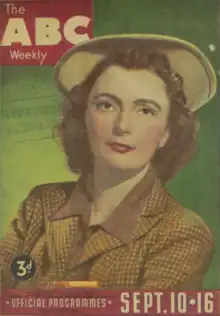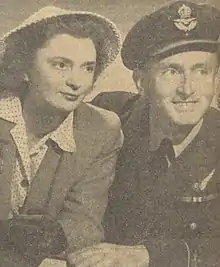Maiva Drummond
Maiva Drummond was an Australian actress of stage and radio, known for her part in the long-running ABC radio serial Blue Hills as Rose Bishop, and had appeared in the predecessor series The Lawsons

Biography
Theatre
Drummond was born in Bathurst, New South Wales lived most of her young life in Hay.[1] She first appeared in amateur productions of A Midsummer Night's Dream and The Boatswain's Mate in Sydney in 1927.[2][3] By 1928 she was teaching elocution back in Hay and held a concert featuring her pupils as a fundraiser for the Parish Hall,[4] where she later produced and performed in many fundraising entertainments.[5][6][7] In 1934 she appeared in Heat Wave with the Little Theatre in Melbourne.[8] The following year she played Florrie in Gregan McMahon's production of Sheppey. Also in the cast was her future husband, Paul O'Loughlin.[9]
Radio
Her radio career began in Melbourne, appearing in radio plays on 3LO. She moved to Sydney in 1937 to take the role of Elsie in the serial As Ye Sow broadcast nationally,[10] meanwhile appearing on stage from time to time, including J. C. Williamson's production of Personal Appearance in which she played a comedy role alongside Peter Finch.[11]

In the 1940s she played Jean Lawson in the long-running serial The Lawsons. To accommodate her pregnancy and early motherhood, Gwen Meredith wrote a train smash into the script.[12]
Drummond and Queenie Ashton had the last lines of the last episode recorded 30 September 1976:
- Rose: It's saying goodbye, Granny. I always feel it's sad to say goodbye.
- Granny: Yes Rose, it certainly is this time . . . but we don't have to see people every day of the week to remember them in their surroundings. It isn't really so hard to say goodbye . . . to say goodbye . . . and God bless.[13]
Personal life
She married Paul O'Loughlin, an RAAF bombardier and ABC radio producer, in Sydney in 1942.[14]
References
- "Maiva Drummond". The Areas' Express. Vol. LXV, no. 3313. South Australia. 10 April 1942. p. 1. Retrieved 7 December 2021 – via National Library of Australia.
- ""Midsummer Night's Dream"". The Daily Telegraph. No. 14, 821. New South Wales, Australia. 10 June 1927. p. 10. Retrieved 1 January 2022 – via National Library of Australia.
- "Three Plays". The Sydney Morning Herald. No. 27, 971. New South Wales, Australia. 29 August 1927. p. 6. Retrieved 1 January 2022 – via National Library of Australia.
- "Entertainment in Aid of Parish Hall". The Riverine Grazier. New South Wales, Australia. 21 August 1928. p. 2. Retrieved 1 January 2022 – via National Library of Australia.
- "In Aid of the Maternity Home". The Riverine Grazier. New South Wales, Australia. 25 September 1928. p. 4. Retrieved 1 January 2022 – via National Library of Australia.
- "The Concert". The Riverine Grazier. New South Wales, Australia. 21 March 1930. p. 2. Retrieved 1 January 2022 – via National Library of Australia.
- ""The Middle Watch"". The Riverine Grazier. New South Wales, Australia. 11 November 1932. p. 2. Retrieved 1 January 2022 – via National Library of Australia.
- "Entertainments". The Argus (Melbourne). No. 27, 442. Victoria, Australia. 1 August 1934. p. 15. Retrieved 1 January 2022 – via National Library of Australia.
- "Players, Plays and Pictures". The Herald. No. 18, 170. Victoria, Australia. 10 August 1935. p. 28. Retrieved 1 January 2022 – via National Library of Australia.
- "Radio Actress". Goulburn Evening Penny Post. New South Wales, Australia. 30 March 1937. p. 3 (Daily). Retrieved 1 January 2022 – via National Library of Australia.
- "Pictures And Plays". The Labor Daily. No. 61. New South Wales, Australia. 26 July 1938. p. 9. Retrieved 1 January 2022 – via National Library of Australia.
- "The Lawsons Celebrates its 1000th Episode", ABC weekly, Australian Broadcasting Commission, 9 (52), 27 December 1947, retrieved 1 January 2022
- Jacqueline Kent (1983). Out of the Bakelite Box. Angus & Robertson. p. 59. ISBN 0207144869.
- "My Husband "We've known what it was to struggle for a living"", ABC weekly, Australian Broadcasting Commission, 9 (46), 15 November 1947, retrieved 1 January 2022